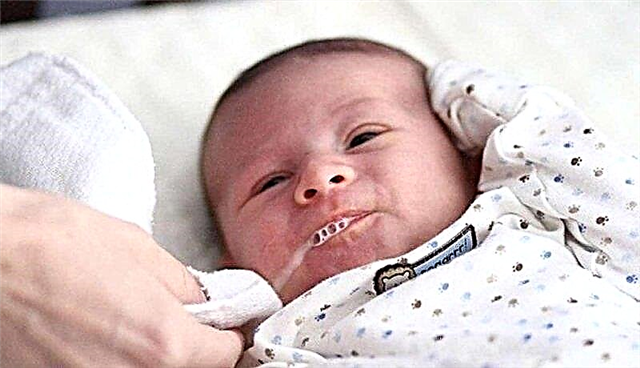The word "no", as well as the particle "not", is perceived by our subconscious, often the other way around, as if programming us to do everything differently than asked. Children are even more susceptible to this effect. When sending your child to the store for bread, you don't have to say: “Don't forget to buy more milk”, because most likely, the child will receive a “no” message. Simply say, "Buy more milk." If you tell a child: “Don't take scissors!”, Most likely, he will want to take them. How important it is for parents to learn to prohibit without prohibiting. How to do it? How to stop using negative statements?

Addicting game "Hour without interdictions"
The essence of the game is that for an hour mom can do without the words “no”, you can’t ”and the particle“ not ”. To begin with, it is worth explaining the rules to the kid - mom does not forbid anything, and you behave well. “Today we have an hour without bans. Do you know how to behave? I can’t forbid you anything, and you, in turn, show how adult you are. I will do my adult business, and you - yours ”... The kids will definitely like this game, because now, as it may seem to him, he is free to do whatever he wants, without risking being punished.
Most likely, this hour will be interesting to the child, he can and really behave well, but he can also check the parents, whether you are really forbidden to forbid, deliberately creating situations in which it will not work without a ban, - walking along the edge of the bed, for example. What to do in this case, because you promised to do without "no"? There is nothing stopping you from reprimanding the child, saying that it is dangerous to do so. You can run up to him with a frightened look to hedge. Tell the little one that you are very scared for him. The kid himself will understand why you did not allow this before., because you are afraid for him and want to save him from trouble. This approach is positive, and an outright ban is always perceived negatively.
It's time to practice a day without inhibitions
When the first game begins to bear fruit, gradually move on to a day without prohibitive phrases. This does not mean at all that now the baby is allowed everything - father and mother have the right to comment and pay attention to the wrong actions of their children... The main thing is to do it correctly, without using the particle “not” and the word “cannot”. How is this possible?
Let's say the son returned from classes an hour after their completion, and usually it takes 30 minutes to get home. Naturally, the parents became worried. The first thing that can break out is: "Why didn't you come home on time?" By asking this, you are breaking the rules of your own game. Try to rearrange the phrase so that the “not” particle is not in it. Ask your child: "Why are you late?" or "Where have you been?" Ask him to come home the next time right after the end of the lessons or to warn about the need to visit a friend: “The next time you are late, call and tell me where you want to go and with whom. Just so that I know and be calm ”... So you made a comment, explained that this should not be done (according to the rules of the game), and made it clear that you are worried and remember that he did not come on time. The child must also understand that this is not a day of permissiveness.
The absence of prohibitions in the words of parents does not mean complete freedom of action and impunity, this is what the baby should learn. When adults do not use the words “no” and “no”, upbringing does not cause protest in children at the psychological level, but, on the contrary, encourages them to do things that will be followed by praise from their relatives. In fact, kids like to be good and to please their loved ones, if they are not forced to do it. It will take about one month to form a new habit of doing without prohibitions; in the future, it will be easy for you to pronounce almost all comments in a positive way.
Constantly improve the skill of not banning

In order not to lose the skill of positive instruction, you need to regularly include yourself and your children in the play process. Children will definitely enjoy the game, according to the rules of which all family members exclude certain words from the use. Trying not to say certain words like “yes”, “no”, “white” or “black” throughout the day and reward the winner and fine the loser in the evening, older children will be delighted. To see clearly who misfired how many times, set small containers for each player. In them you will add penalty papers - whoever has more of them will lose.
As a punishment for using forbidden words in speech, you can ask to squeeze out several times from the floor, wash the dishes, eat a lemon. Fines should not be humiliating or unenforceable. You shouldn't leave the winner without encouragement - then next time he will put even more efforts to win... This kind of play can relieve bad moods and bring family members closer together, so practice it more often. As a result, everyone will be able to learn to control their speech, and this is useful for both parents and children.
What to do if it is impossible to do without a ban?
There are situations when it is impossible to exclude a ban on some action. What to do then? In this regard, it is better to use some of the rules set out below.
- If you tell your child "no", be sure to accompany him with a detailed explanation of the reasons. Children who understand why they are prohibited from doing a particular act more easily follow parental guidance. We also read: how to tell a child “not allowed”.
- Don't use prohibitions too often, only when necessary. When doing this, discuss possible exceptions to the rule with the children. For example, a schoolchild cannot leave the yard, from the mother's line of sight, but if you still need to visit a friend, you need to warn adults about this.
- Try not to use the contradictions that are important for physical and mental development: "do not run", "do not jump", "do not shout", or interest in something else.
- Never use a commanding tone in dealing with children and do not set conditions, this will cause backlash and irritation. A suitable form for prohibitions is explanatory-friendly.
- When introducing restrictions for children, be sure to negotiate and coordinate them with other family members so that the parents' opinion coincides. Otherwise, the child will manipulate you.
So that the child learns to more easily perceive the parental advice, and also to avoid unnecessary conflicts with him, take note of a few more useful tips.
- When forbidding something to children, follow your own rules - do not do what is forbidden for them;
- Keep away objects that the child should not touch - needles, knives, scissors, medicine. By removing these things from the baby's field of vision, you do not have to prohibit touching them;
- Try to use less words - "it is necessary", "you must", pronounce phrases so that they are easy to perceive psychologically. For example, instead of saying: “You should eat all the porridge”, say this: “Children who eat everything become strong and healthy”;
- When a toddler refuses to do what he doesn't want to do, give him a choice, rather than confronting him with a fact. For example, he does not want to get ready for the street, then do not say directly: “We will go for a walk,” but ask his opinion - will you go to the park or to the playground? Children love to make decisions. Having made his choice, the child will willingly go for a walk. This psychological technique allows the mother to achieve what she wants without putting pressure on the baby.
Be wise, find the right approach to your children, get rid of negative phrases and prohibitions. Soon you will see the result - it will become much easier to cope with the once uncontrollable tomboys.
- how to refuse a capricious child? How to tell a child: “No”?
- what can and cannot be prohibited to a child
How to forbid a child without forbidding - child psychologist Yulia Milovanov talks about this in the program “Everything is much easier” with her permanent host Rina Korchminsky:



